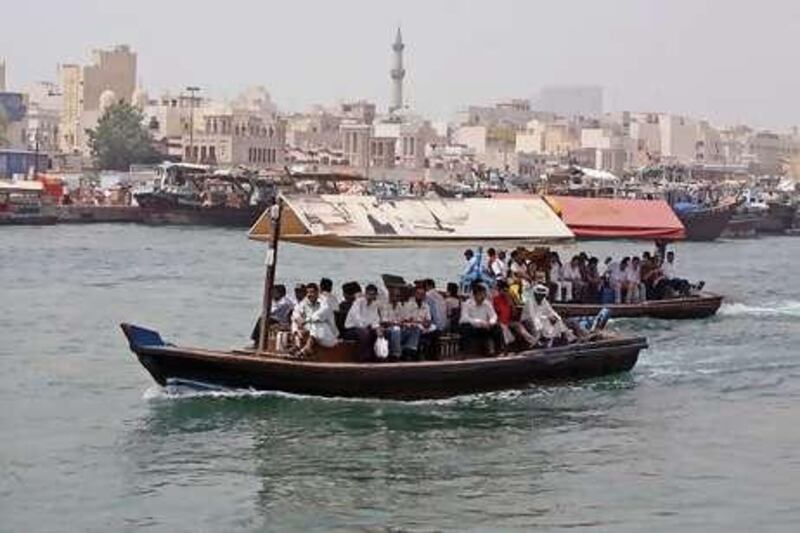DUBAI // Once the only way to cross Dubai's famous creek, the traditional wooden abra has become a symbol of the emirate's heritage and a must-do activity for millions of tourists every year. But now the abra is finding a new role in the modern world, playing an increasingly important part in the Government's fight to cut traffic congestion in bustling Deira and Bur Dubai. For thousands of commuters every day, these cheap and charming vessels provide a welcome alternative to the frustration of crawling across the water in gridlocked traffic on one of the creek's road crossings.
Official statistics published yesterday indicated that recent efforts by the Roads and Transport Authority (RTA) to promote the boat service as a convenient way of beating the traffic chaos were starting to pay off. The number of passengers using the motorised vessels to cross Dubai Creek has risen by 10 per cent since last year. The increase demonstrates the success of the RTA's ongoing push to promote marine transport as an alternative to cars as part of its long-term aim of significantly cutting traffic congestion, says the authority.
Abras carried more than 7.5 million passengers in the first three months of this year, representing a 10 per cent rise compared with the same period in 2007. The first quarter of 2008 saw a total of 387,706 abra trips, shuttling passengers on two routes, one between Deira Old Souq Station and Bur Dubai Station and the other between Dubai Old Souk Station and Al Sabkha Station. Costing just Dh1 per trip, Dubai's fleet of 149 abras represent one of the cheapest modes of public transport on the planet - a bargain that is attracting a wide range of commuters.
A recent survey by the RTA's Marine Agency showed that the average salary of an abra commuter was between Dh4,000 (US$1,088) and Dh5,000 a month, pointing towards increased use by more affluent passengers. "We were surprised by this, because it shows it is not just people on lower salaries using the service," said Dr Khalid Al Zahed, acting CEO of the Marine Agency. "Among those using the abras to commute are people working in good jobs in banks and finance in the area of the creek, and this is something we are very pleased about.
"There are so many advantages to the abras as opposed to using the car: if you make your way across one of the bridges in the morning it will take you maybe 45 minutes to cross the water. The abra takes less than 10 minutes." And, he said, "it is possibly the cheapest mode of transport in the world. We have done so many things to improve the service and encourage people to use the abras. This includes better maintenance and upgrading some of the older boats, and making the entrances and exits at the stations easier to use."
The RTA's marine agency has been busy promoting Dubai Creek's abras - along with its water-taxi and water-bus services - as a cheap, efficient mode of transport cutting out the inevitable traffic delays associated with crossings such as Maktoum Bridge and the Al Shindagha Tunnel. The marketing strategy included a leaflet campaign asking businesses located on the banks of the Creek to encourage their staff to use the boats as a part of their daily commute.
Many people working in Deira and Bur Dubai do not need any more convincing and have factored the abra into their journeys. Adam Taylor, 30, a finance officer, recently decided he had had enough of battling his way through the Al Shindagha Tunnel every day to get to work at Union Square from his home in Mankhool. "I used to drive through the tunnel and it was just a nightmare and took for ever," he said. "So about three months ago I decided to go to work one day by taking a taxi to the abra station, crossing the creek and walking from there. I found it so much better - much quicker and less stressful, so I do it every day now."
Nila Verghese, 42, works as a language teacher in Bur Dubai. He said the boats had made his commute from Deira far easier. "I now use a combination of taxi and abra to get to and from work every day. I've been doing that for about a year now and would never dream of attempting the journey by car. I don't drive much in Dubai anyway because of congestion. "I find the abra easy to use and fairly comfortable for such a short journey."
Hussain al Saffar, director of operation and performance at the marine agency, said the total number of passengers using abras in 2007 was 28 million, a figure expected to rise by seven per cent this year. "The motorised abra is essential for providing a smooth, safe and quality commuting service across Dubai Creek, contributing to the realisation of the RTA vision of providing safe and smooth transport for all," he said.
The new statistics showed that in January, 2,598,784 passengers crossed the water by abra in 129,939 trips, and in February 2,746,656 passengers commuted in 123,832 trips. In March, the number of passengers was 2,498,681 ferried in 124,934 trips. Last week, the RTA launched a pilot project in which three abras are being fuelled by environmentally clean compressed natural gas. Marine mass transit systems form a key part of the RTA's goal of tackling Dubai's road congestion problems by encouraging residents to abandon their cars in favour of public transport.
Mr Saffar added: "Marine transport projects will continue to take shape in a series of developments aiming to eliminate possible traffic congestion. The agency will always aim to capitalise on the time saved and speed of marine transport." @Email:arichardson@thenational.ae






